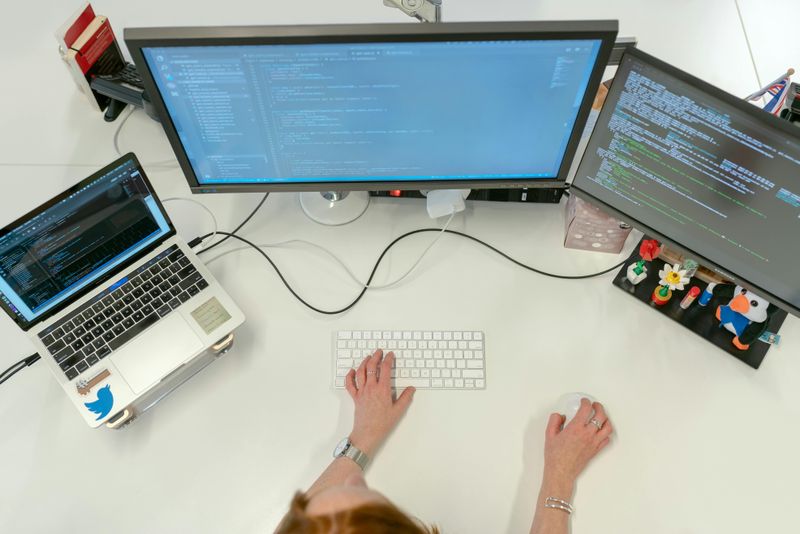We all complain about not having enough hours in the day, yet we might be our own worst enemies when it comes to time management. Hidden throughout our daily routines are sneaky habits that quietly drain our precious minutes and hours. These time thieves operate so smoothly that we rarely notice them until we wonder where our day went.
1. Endless Social Media Scrolling
That quick peek at Instagram turns into 45 minutes of mindless thumb-flicking before you even realize it. The infinite scroll feature is deliberately designed to keep you engaged without natural stopping points.
Your brain gets tiny dopamine hits with each new post, making it surprisingly difficult to pull away. Many people check their phones over 150 times daily, with each check potentially spiraling into extended browsing sessions.
Try setting a timer when you open social apps, or use screen time limiting features to break free from this particularly sticky time trap.
2. Meeting Overload
Calendar packed with back-to-back meetings? Research shows nearly 71% of professionals feel their productivity suffers from excessive meetings. The average employee spends 31 hours monthly in unproductive meetings!
Beyond the scheduled time, there’s also context-switching cost – that mental adjustment period between different topics that further erodes your day. Meeting fatigue is real and drains both time and mental energy.
Consider implementing meeting-free days or requiring agendas for all meetings to reclaim those lost hours and boost your productivity.
3. The Notification Avalanche
Every ping, ding, and vibration hijacks your attention. Each notification interruption costs about 23 minutes to regain concentration on your original task fully. Most smartphone users receive between 65-80 notifications daily!
The constant alerts create a state of perpetual partial attention, preventing deep focus on anything meaningful. Your brain becomes conditioned to expect and crave these interruptions, making sustained concentration increasingly difficult.
Take control by turning off non-essential notifications and designating specific times to check messages instead of responding to every alert immediately.
4. Perfectionism Paralysis
Spending three hours on a simple email because every word must be perfect? Perfectionism tricks you into believing that excellence requires endless refinement. The truth is, most tasks follow the 80/20 rule – 80% of value comes from the first 20% of effort.
Constantly redoing and tweaking projects prevents completion and steals time from other priorities. Many perfectionists struggle with starting tasks because they fear imperfect outcomes.
Set time limits for tasks and embrace the concept of “good enough” for most everyday activities. Save perfectionism for truly critical projects.
5. Decision Fatigue
Spending 15 minutes deciding what to watch on Netflix might seem harmless, but decision fatigue accumulates throughout your day. The average adult makes about 35,000 decisions daily, each one depleting mental energy.
Small choices like what to wear or eat might consume disproportionate time and brainpower. Studies show decision quality deteriorates as the day progresses due to mental exhaustion.
Create personal systems for recurring decisions – meal planning, outfit formulas, or scheduled activities. Famous figures like Steve Jobs wore the same outfit daily specifically to eliminate unnecessary decisions and preserve mental energy.
6. Email Obsession
Constantly checking your inbox creates a reactive workday where other people’s priorities dictate your time. The average professional checks email 77 times daily, spending over 3 hours just processing messages!
Email creates an illusion of productivity while actually fragmenting your attention and preventing meaningful progress on important work. Many messages require just seconds to read but minutes to refocus afterward.
Try scheduling specific email-checking times (perhaps 2-3 times daily) rather than leaving your inbox open all day. Use auto-responders for urgent matters and unsubscribe from newsletters you rarely read.
7. Multitasking Madness
Jumping between tasks might feel efficient, but research proves otherwise. True multitasking is impossible for the human brain – we actually switch contexts rapidly, which reduces efficiency by up to 40%.
Each task switch requires mental resources to reorient, leading to more errors and longer completion times. What looks like productivity is actually a performance penalty that stretches your workday unnecessarily.
Group similar tasks together and work in focused blocks of time. Try the Pomodoro Technique – 25 minutes of single-task focus followed by a short break – to maintain concentration and accomplish more in less time.
8. The Planning Fallacy
Consistently underestimating how long tasks will take creates perpetual time pressure and disappointment. Research shows people typically underestimate completion time by 40-60%, even for familiar tasks!
This cognitive bias leads to overscheduling, missed deadlines, and chronic rushing. The stress from always running behind further reduces efficiency and enjoyment of activities.
When estimating task duration, try multiplying your initial guess by 1.5 for familiar tasks and 2 for new ones. Build buffer time between commitments and learn to say no to preserve your schedule integrity.
9. Disorganized Digital Files
Minutes turn to hours as you hunt through folders trying to find that one document from last month. Digital clutter creates surprising time drains – professionals spend an average of 9.3 hours weekly just searching for information!
Without a consistent file naming system and folder structure, each search becomes a frustrating treasure hunt. Email attachments, downloads, and shared files create multiple versions that further complicate retrieval.
Invest time in creating a logical filing system with clear naming conventions. Use search-friendly keywords and regular digital decluttering sessions to maintain order and reclaim those lost hours.
10. Mismanaged Energy Levels
Attempting complex work when your energy is low forces tasks to take twice as long. Your brain has natural cycles of peak performance and rest throughout the day, yet most people ignore these rhythms.
Morning people often waste their high-energy hours on low-value tasks like checking email, saving important work for when fatigue sets in. Night owls might struggle through important morning meetings when their brains aren’t fully online.
Track your energy patterns for a week and schedule your most demanding tasks during peak hours. Save administrative or routine work for low-energy periods to maximize your natural productivity cycles.










